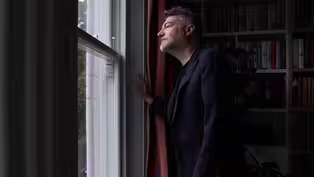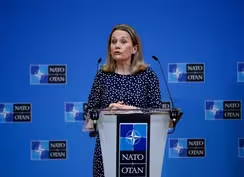
Tamara Keith and Amy Walter on Biden's trip to Europe
Clip: 7/10/2023 | 8m 52sVideo has Closed Captions
Tamara Keith and Amy Walter on Biden's trip to Europe and presidential campaign politics
NPR’s Tamara Keith and Amy Walter of the Cook Political Report with Amy Walter join Geoff Bennett to discuss the latest political news, including President Biden's trip to Europe and presidential campaign developments.
Problems playing video? | Closed Captioning Feedback
Problems playing video? | Closed Captioning Feedback
Major corporate funding for the PBS News Hour is provided by BDO, BNSF, Consumer Cellular, American Cruise Lines, and Raymond James. Funding for the PBS NewsHour Weekend is provided by...

Tamara Keith and Amy Walter on Biden's trip to Europe
Clip: 7/10/2023 | 8m 52sVideo has Closed Captions
NPR’s Tamara Keith and Amy Walter of the Cook Political Report with Amy Walter join Geoff Bennett to discuss the latest political news, including President Biden's trip to Europe and presidential campaign developments.
Problems playing video? | Closed Captioning Feedback
How to Watch PBS News Hour
PBS News Hour is available to stream on pbs.org and the free PBS App, available on iPhone, Apple TV, Android TV, Android smartphones, Amazon Fire TV, Amazon Fire Tablet, Roku, Samsung Smart TV, and Vizio.
Providing Support for PBS.org
Learn Moreabout PBS online sponsorshipGEOFF BENNETT: For analysis of the president's trip abroad and presidential campaign politics, we turn now to our Politics Monday team.
That's Amy Walter of The Cook Political Report With Amy Walter and Tamara Keith of NPR.
So, happy Monday, as they say.
(LAUGHTER) TAMARA KEITH, National Public Radio: Yes.
GEOFF BENNETT: President Joe Biden is in Europe, where he's spending four days in three nations, tending to alliances, some of which have been tested by Russia's invasion of Ukraine.
So, Tam, give us a sense.
What's on the agenda and what's at stake?
TAMARA KEITH: So, President Biden is once again trying to make the case that America is back and that America is a trusted partner and that this alliance that Putin's invasion of Ukraine made stronger is holding tight.
And obviously, as we have just heard in this conversation, there's discussion of Sweden being allowed to join NATO.
That -- it appears there has been a breakthrough on that.
President Biden had a call with President Erdogan of Turkey on the flight over.
So what's at stake is sort of the shape and size of the alliance, but also, domestically, the perception of the war in Ukraine and the U.S. role in that.
GEOFF BENNETT: About that, there is this chorus on the right, people who say that the U.S. has given Ukraine too much at this point.
And even on the left now, there's some progressive voices who have found issue with President Biden's decision to give cluster munitions to Ukraine.
Help us understand.
Sort of distill the politics here of Ukraine aid.
AMY WALTER, The Cook Political Report: That's right.
I think a lot of it, though, still is -- the dividing line really is, do you identify more as a Republican, do you identify more as a Democrat, rather than intraparty fights.
There are some bubbling.
As we know, on the presidential side, you have Republicans like Donald Trump, like Ron DeSantis being less supportive of more aid to Ukraine, versus what I would call more of the old-school Republicans, defense hawks like Mike Pence or Nikki Haley.
But, fundamentally, what we saw at the very beginning, when the invasion happened, support among Democrats and Republicans for the U.S. doing more was equal.
It took about six months for partisanship to really take hold.
GEOFF BENNETT: Which is a long time these days.
AMY WALTER: It is a long time these days, that it took that long.
GEOFF BENNETT: Yes.
(CROSSTALK) AMY WALTER: But I think -- I think that -- and this is really what's remarkable -- if you think back to what could be a unifier for Americans in this time of depolarization, an invasion of a sovereign country by Vladimir Putin would probably be one of those unifying voices -- unifying events.
And it truly was,until it became about Biden, and then it became much less about Putin, and much more about, do you really support this president?
GEOFF BENNETT: And, Tam, shifting our focus back stateside, President Biden has been trying to persuade Americans that the economy is better than they think it is and that he deserves credit for turning it around.
It's tough going, though, when the White House is faced with polls like this one.
This is a Quinnipiac poll that shows 55 percent disapproval.
We should say this is an early June.
How is this effort -- the White House has dubbed this Bidenomics.
How is this effort going?
Is it yielding results yet?
TAMARA KEITH: I wouldn't say that it's necessarily yielding results.
The views of the economy are polarized, just like views on everything else, which is to say that Republicans say the economy is terrible, because Joe Biden is president of the United States.
So, the same Republicans thought the economy was incredible under Donald Trump.
And the reality is that, aside from the big pandemic period, the economy is -- the Biden economy has basically recovered to where Trump was pre-pandemic.
But there is this divide, this pulling apart, where Americans say that their personal economy is pretty great.
Like, they feel good about how they're doing.
They feel optimistic about their future.
How is the U.S. economy doing?
Terrible.
And that's the influence of polarization right there.
GEOFF BENNETT: Break that apart.
I mean, I remember talking to a Democratic pollster who said that people will be asked that question, how's the economy doing, and they will think, I'm not crazy about my job, not crazy about my boss, that means the economy's doing poorly.
(LAUGHTER) GEOFF BENNETT: Right.
AMY WALTER: I was talking for a piece I wrote the other week with a Democratic strategist, who said something similar, which is: I don't trust any of this data, whether it's consumer confidence, or do you approve or disapprove, to tell us how people really feel about the economy.
Asking people about the economy, you're asking them, as you point out, about a lot of other things.
At the same time, there's -- there is no doubt that inflation still is taking something of a bite out of people's wallets.
And that's a lot of what this frustration is.
We're not quite yet back to a place where the Fed feels comfortable enough to say, OK, we have got gotten inflation under control.
I also think there's a bit of a messenger problem.
The other poll number that you will see next to do, how well do you think President Biden's doing on the economy or other issues is, what do you think about his mental, physical fitness?
What do you think about his age?
And there's a lot of concern about that across the board.
Obviously, more Republicans feel that way than Democrats.
But, as a messenger, being able to sell also means people have to see you as being, like, a credible person doing that.
And I think those two things, you can't necessarily separate worries about his age with worries about how well he's handling the economy and will handle the economy if he's reelected.
GEOFF BENNETT: We have got a couple of minutes left.
I want to fit in what's happening on the Republican side of the ledger here with Ron DeSantis.
His poll numbers have slid.
His competition is growing.
The head of his -- or a spokesperson for his super PAC said last week, "We are way behind."
He was asked about this during an appearance on FOX News, and here's what he said.
GOV.
RON DESANTIS (R-FL), Presidential Candidate: Oh, Maria, these are narratives.
The media does not want me to be the nominee.
I think that's very, very clear.
But this is not something that I ever expected to just snap fingers and, all of a sudden, you win seven months before anyone happens.
You got to earn it, and you got to work.
And it requires a lot of toil and tears and sweat, and we're going to do that.
GEOFF BENNETT: So, he's blaming the media for creating false expectations.
And he's saying: Give my campaign time to do its thing.
That sounds pretty reasonable.
AMY WALTER: It does sound reasonable.
We are very far out.
And you are right.
If you look back at previous elections, plenty of folks who had been written off or not even paid attention to it all ended up either coming close or winning the nomination.
What's different about this is that Donald Trump is essentially an incumbent, and beating an incumbent is a very thing to -- a very difficult thing to do.
It's not 2015.
It is -- we have a party that is much more Trump-organized and Trump-centric than it was obviously back then.
And he's much more popular, considerably more popular, among Republicans.
So the threat -- the sort of way to beat Donald Trump, you think about it as this very narrow gap, right?
How do you find a way through that?
DeSantis is trying to figure out his way, going to the right of him on cultural issues.
We have got some other candidates going to the right of him on security issues, obviously, Chris Christie going right at him on the indictments.
None of it seems to be penetrating his popularity.
GEOFF BENNETT: So, Tam, is this a two-person race between -- on the Republican side between Trump and DeSantis, as DeSantis says it is?
TAMARA KEITH: Well, DeSantis would sure like it to be.
(LAUGHTER) TAMARA KEITH: However, there are a lot of other candidates.
And what DeSantis has said is: Don't look at the national polls.
Look at how I'm doing in these early states, where I'm putting a lot of emphasis.
Well, we don't know yet because there isn't great polling out of these early states.
A lot of other candidates on that list have that same strategy, which is: Let's just win Iowa and then knock Trump -- if Trump looks like he's weak, then we can take him on.
So it's Iowa.
It's New Hampshire.
It's early.
GEOFF BENNETT: Well, before we go, I mentioned the Congressional Women's Softball Game.
Members of Congress play members of the D.C. press corps.
I hear that you too are on the D.C. press corps team.
AMY WALTER: We are on the team, pitcher, catcher.
TAMARA KEITH: Catcher.
GEOFF BENNETT: There you go, as are a number of our beloved "NewsHour" staff members, team members here.
AMY WALTER: Yes.
GEOFF BENNETT: And we should say that people can donate online.
They -- because it's a fund-raiser.
It raises money.
AMY WALTER: That's right.
It raises money for breast cancer, the Young Survival Coalition.
It's raised over $3 million since we started this game about 15 years ago.
GEOFF BENNETT: Fantastic.
Well, thank you so much.
And I will be watching on Wednesday.
TAMARA KEITH: On the livestream.
Affirmative action ruling could impact med school diversity
Video has Closed Captions
Clip: 7/10/2023 | 5m 43s | Affirmative action ruling raises concerns over impact on medical school diversity (5m 43s)
'Black Mirror' creator on why the show has gripped audiences
Video has Closed Captions
Clip: 7/10/2023 | 7m 15s | 'Black Mirror' creator on why the techno-dystopian show has gripped audiences (7m 15s)
Cycle of violence pushes young Palestinians to take up arms
Video has Closed Captions
Clip: 7/10/2023 | 7m 13s | Cycle of violence and economic turmoil pushes young Palestinians to take up arms (7m 13s)
Eastern U.S. hit with flooding, heat wave drags on in West
Video has Closed Captions
Clip: 7/10/2023 | 7m 52s | Eastern U.S. hit with flooding as heat wave drags on in West and South (7m 52s)
Lawsuit filed by Tulsa Race Massacre survivors dismissed
Video has Closed Captions
Clip: 7/10/2023 | 7m 6s | Okla. judge dismisses restitution lawsuit filed by last survivors of Tulsa Race Massacre (7m 6s)
U.S. ambassador to NATO discusses future of alliance
Video has Closed Captions
Clip: 7/10/2023 | 6m 27s | U.S. ambassador to NATO discusses future of alliance ahead of crucial summit (6m 27s)
Providing Support for PBS.org
Learn Moreabout PBS online sponsorshipSupport for PBS provided by:
Major corporate funding for the PBS News Hour is provided by BDO, BNSF, Consumer Cellular, American Cruise Lines, and Raymond James. Funding for the PBS NewsHour Weekend is provided by...
















